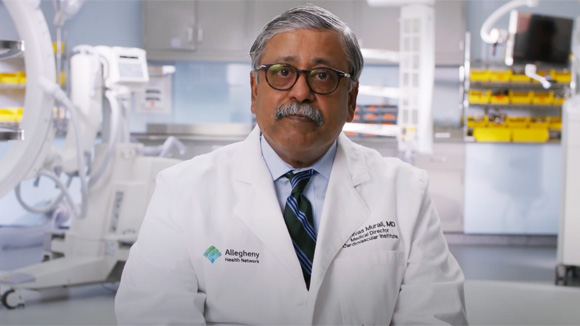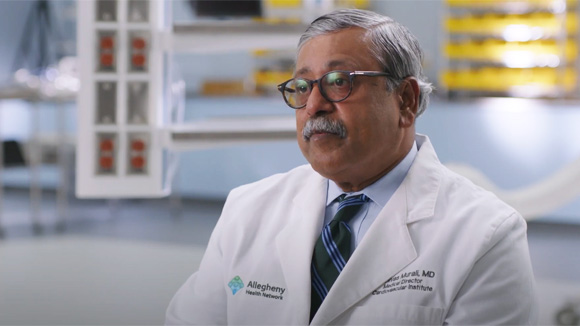Amyloidosis
What is amyloidosis?
Amyloidosis happens when the body incorrectly deposits defective proteins (amyloid) in one or more organs, which can lead to organ failure and sometimes even death. These proteins build up and cause dysfunction in several organs, including the heart, kidneys, gastrointestinal tract, nervous system, skin, and tongue. When amyloid builds up in heart tissue, it’s known as cardiac amyloidosis, a condition that can eventually impact the heart’s ability to pump blood. Often, patients with amyloidosis will see several doctors before the right diagnosis is reached.
At the AHN Amyloidosis Program, a team of doctors from various specialties collaborate to offer individualized treatment plans. These patient-centered therapies slow down the disease to help you feel better, for longer.

"We have a wonderful cardiac amyloid team here which has allowed us to be highly successful in managing these patients and making sure that they are all benefiting the most from available therapies."
Srinivas Murali, MD — Cardiology Specialist
Diagnosing amyloidosis
Two primary types of cardiac amyloidosis include:
- Transthyretin amyloidosis (ATTR amyloidosis).
- Light chain amyloidosis (AL amyloidosis).
Common cardiac amyloidosis symptoms include:
- Congestive heart failure with unexplained thickening of the heart muscle.
- Unexplained weakness, numbness, or pain in the hands or feet.
- Unexplained low back pain.
- Irregular heartbeats that may be too fast or too slow.
- Dizziness or fainting with changes in position.
- Abnormal kidney function.
- Rapid weight loss.
- Diarrhea.
- An unusually large tongue.
These symptoms are nonspecific and often associated with other conditions. However, such symptoms often determine the need for further testing to screen for amyloidosis.
Confirming an amyloidosis diagnosis
In order to confirm an amyloidosis diagnosis and identify the specific subtype, AHN offers:
- Laboratory tests of blood and urine.
- Imaging tests, such as ultrasound (echocardiogram), MRI, and/or nuclear study (technetium pyrophosphate or PYP scan).
- Neurologic tests, including state-of-the-art quantitative sudomotor axon reflex testing (QSART).
- In rare cases, a biopsy from an affected organ is necessary to make the diagnosis.

"Amyloidosis is a condition where you really need a team because there are so many aspects to the diagnosis, treatment and follow-up."
Srinivas Murali, MD — Cardiology Specialist
Treating amyloidosis
Treatment depends entirely on the subtype of amyloidosis and the organs that have been affected. Currently available treatments focus on stopping production of the defective proteins, removing deposits that have already accumulated, and helping the organs become more functional.
Treating light chain amyloidosis (AL)
Light chain amyloidosis happens when too many antibody fragments called “light chains” are overproduced by the bone marrow. This process is cancer-like, so we work closely with hematologist-oncologists. As a team, we use chemotherapy to destroy those light-chain producing “factories.” Sometimes, a bone marrow transplant may be considered.
Treating transthyretin amyloidosis (ATTR)
Transthyretin amyloidosis occurs when a defective transporter protein called transthyretin (TTR) is produced by the liver. These proteins can be abnormal due to either a mutation in the genetic code that is present at birth or, more commonly, as a consequence of aging. Some new medicines prevent defective TTR proteins from being produced by the liver, while others prevent abnormal proteins from being deposited in various organs.
For individuals with transthyretin amyloidosis (ATTR), genetic testing and counseling can help families confirm a diagnosis, guide treatment decisions, and plan for the future. Just having the mutation doesn’t mean someone will develop the disease, but it does mean that active monitoring is required and that the risk factor may be passed along to the next generation.
Contact us
Call (412) DOCTORS (412) 362-8677 or request an appointment with AHN cardiovascular services.
-
Appointments
Cardiovascular Institute(412) DOCTORS
By accessing this video, I understand that I am leaving the AHN website and I will be re-directed to an external website operated by a third party platform provider. I acknowledge that the platform provider may collect personal information about me, and about the video that I view, on their platform and may use and disclose this information in accordance with its privacy policy. I agree that Allegheny Health Network is not responsible for the data collection and use practices of this third party.

